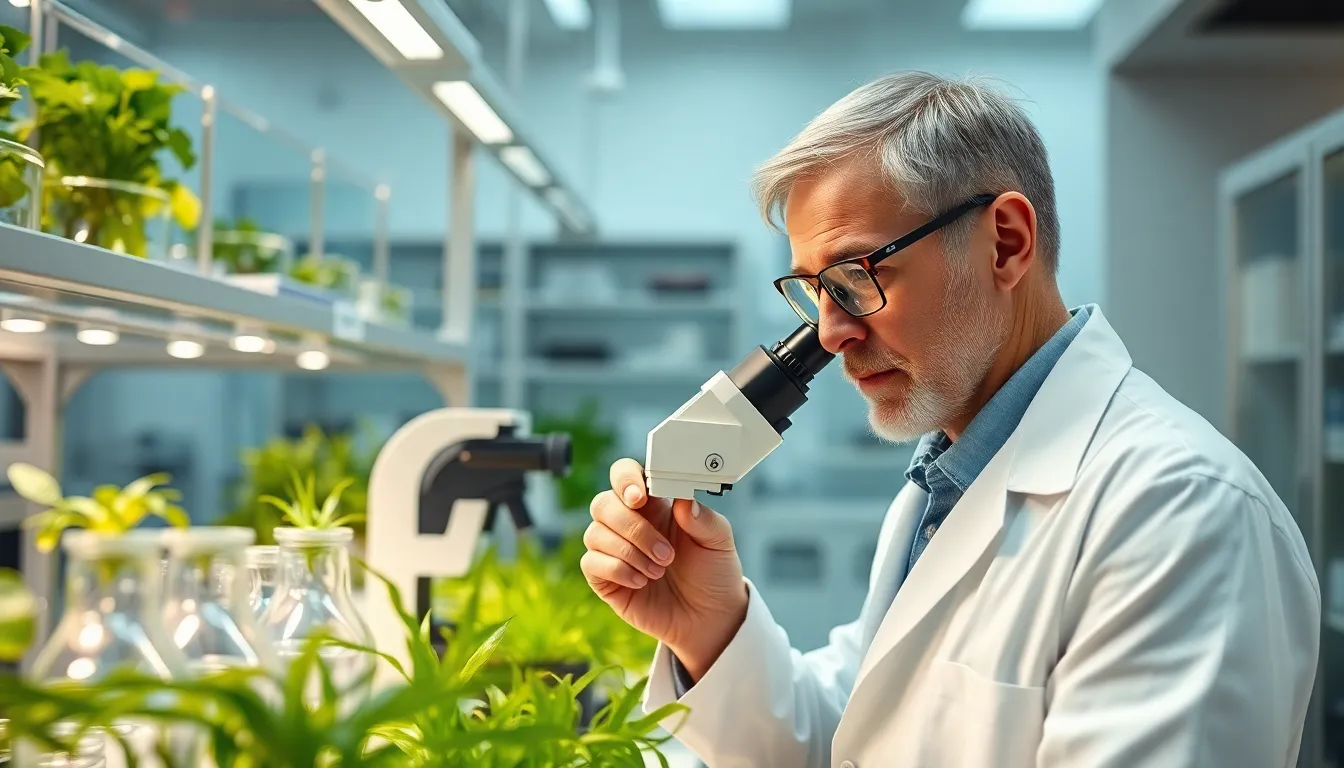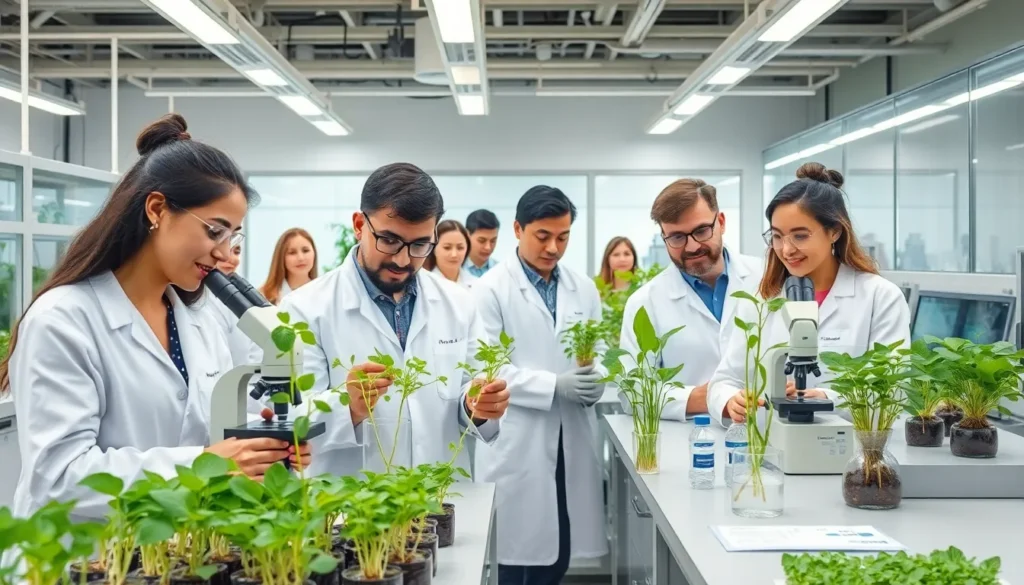In a world where even your houseplants seem to have their own social media accounts, <a href="https://zuusignals.com/biotech-sustainability”>plant biotech is the unsung hero making waves behind the scenes. Imagine a future where crops are not only resilient to pests but also taste like they were kissed by the sun itself. It’s not just science fiction; it’s happening right now.
Table of Contents
ToggleOverview of Plant Biotech
Plant biotechnology encompasses various techniques to modify plants for desired traits. Genetic engineering stands at the forefront, allowing for precise alterations to plant genes. Through this method, scientists can enhance crop resistance to diseases and environmental stresses, improving overall yield.
Marker-assisted selection is another significant approach. It involves identifying specific genes linked to traits, enabling breeders to select plants with favorable characteristics more efficiently. This process accelerates traditional breeding methods, promoting faster development of resilient crop varieties.
Tissue culture offers an additional dimension to plant biotech. This technique enables the growth of plants from cells or tissues in a sterile environment. As a result, growers can produce disease-free plants in a controlled setting, ensuring consistent quality and enhanced growth rates.
Transgenic crops represent a notable innovation within plant biotechnology. These crops contain genes from other species, providing benefits like pest resistance and herbicide tolerance. Studies indicate that transgenic crops can reduce reliance on chemical pesticides, thus benefiting both the environment and farmers’ profitability.
Sustainability also plays a crucial role in plant biotech advancements. By developing crops that thrive in less-than-ideal conditions, researchers contribute to food security amid climate change. Crop varieties that use water more efficiently or require less fertilizer can significantly reduce the agricultural ecological footprint.
Overall, plant biotechnology presents a transformative opportunity for agriculture. It promises enhanced traits, improved sustainability, and the potential for increased food production as global demand rises. The continuous research and innovation in this field serve as vital steps towards achieving a resilient agricultural future.
Key Techniques in Plant Biotech

Plant biotechnology employs various techniques to enhance agricultural practices. Key methods include genetic engineering and tissue culture.
Genetic Engineering
Genetic engineering modifies plant DNA to express desirable traits. This technique allows scientists to insert, delete or alter genes with precision. Improved disease resistance results from these modifications, leading to higher crop yields. It enables the development of plants that thrive under stressful conditions, such as drought or high salinity. The creation of transgenic crops demonstrates this technology’s efficacy, offering traits like pest resistance and enhanced nutritional content. Researchers continue to explore regulations to ensure safety and efficacy in food production.
Tissue Culture
Tissue culture involves growing plants in a controlled environment using sterile conditions. This method produces disease-free plants, ensuring consistency in quality and health. Propagation rates improve significantly through tissue culture, allowing rapid multiplication of desirable strains. A diverse range of plants, including fruit trees and ornamental plants, benefit from this technique. The process begins with explants taken from parent plants, which are then cultured on media enriched with nutrients. Successful tissue culture systems can lead to large-scale production, addressing market demands efficiently.
Applications of Plant Biotech
Plant biotechnology demonstrates a variety of applications that enhance agriculture and promote sustainability. Innovations in crop improvement, pest resistance, and environmental benefits showcase significant progress in this field.
Crop Improvement
Enhanced crop varieties emerge from plant biotech techniques. Genetic engineering leads to the development of transgenic crops, maximizing yield and nutritional content. Drought-resistant plants thrive in challenging climates, ensuring food security. Marker-assisted selection speeds up breeding by efficiently identifying plants with favorable traits. Breeders can select for disease resistance, ultimately increasing overall crop resilience. Faster propagation through tissue culture supports the rapid multiplication of superior plant strains, increasing access to high-quality planting materials.
Pest Resistance
Pest management benefits significantly from plant biotechnology advancements. Genetic modification enables the creation of crops resistant to specific pests, reducing the need for chemical pesticides. These pest-resistant plants decrease crop damage and offer sustainable solutions without harming beneficial organisms. Bt crops, which express a toxin from the bacterium Bacillus thuringiensis, demonstrate effectiveness in controlling targeted insects. Farmers utilizing such crops see reduced pest populations, leading to higher productivity and lower pesticide costs.
Environmental Benefits
Environmental sustainability plays a crucial role in the applications of plant biotech. Modified crops can adapt to harsh conditions like drought, increasing agricultural efficiency in unpredictable climates. Utilization of less water and fewer chemical inputs enhances resource conservation. Furthermore, biotechnology encourages biodiversity by supporting the cultivation of resilient crop varieties. Soil health improves with reduced chemical application and enhanced crop rotation practices. Overall, these environmental benefits contribute to more sustainable agricultural practices that mitigate climate change challenges.
Challenges and Controversies
Plant biotechnology faces various challenges and controversies that spark debate among scientists, policymakers, and the public. These issues often center around ethical considerations and regulatory frameworks.
Ethical Considerations
Concerns about the ethics of genetic modification arise frequently in discussions about plant biotech. Genetic engineering impacts the natural genetic diversity of crops, prompting questions regarding long-term ecological effects. Some worry that transgenic crops might inadvertently crossbreed with wild relatives, affecting local ecosystems. Additionally, the ownership of genetically modified organisms raises ethical dilemmas. Many argue that patents on life forms could lead to monopolies in agriculture, limiting access for farmers and smallholders. Public perception also plays a significant role, as misinformation about genetically modified organisms can lead to resistance against their adoption.
Regulatory Issues
Regulatory frameworks surrounding plant biotechnology often vary by region and country. Many nations require extensive testing before genetically modified crops can enter the market. These regulations aim to ensure safety and efficacy but can slow down innovation. Discrepancies in regulations create challenges for international trade, as different countries impose varying standards. Furthermore, labeling requirements for genetically modified products provoke disagreements among stakeholders. Some advocate for clear labeling to empower consumer choice, while others argue it could unfairly stigmatize genetically modified crops. Balancing public safety, innovation, and consumer rights remains a key regulatory challenge in this rapidly evolving field.
Future of Plant Biotech
Advancements in plant biotechnology promise to transform agriculture significantly. Researchers are focused on creating crops that not only resist pests but also enhance flavor profiles. Genetic engineering remains a pivotal technique, allowing precise modifications to plant genes. Improved crop resistance to diseases and environmental stresses results in higher yields. Transgenic crops offer vital benefits such as pest resistance and improved nutritional content.
New techniques like marker-assisted selection accelerate traditional breeding processes. Such methods identify specific genes linked to desirable traits, making plant selection more efficient. Tissue culture contributes by enabling the cultivation of disease-free plants in sterile environments. Enhanced propagation rates lead to rapid multiplication of superior plant strains, impacting a range of crops from fruits to ornamental plants.
The application of plant biotech supports sustainable agricultural practices effectively. Enhanced crop varieties maximize yield and nutritional value, particularly in crops engineered for drought resistance. Genetic modifications reduce dependence on chemical pesticides, making pest management more sustainable. Experiments show modified crops adapting well to challenging environments while utilizing fewer resources.
Environmental sustainability is also a vital focus area. Modified plants contribute to soil health through minimized chemical usage and improved adaptation to harsh conditions. Continuous research drives innovation, ensuring a resilient agricultural future. Addressing regulatory frameworks enhances safety and efficacy in food production, balancing public safety and innovation.
Challenging debates persist regarding ethical implications and ecological impacts. Issues arise over genetic modification’s effects on natural diversity and potential crossbreeding with wild species. Ownership questions related to genetically modified organisms create concerns about agricultural monopolies and farmer access. Regulatory inconsistency across regions complicates testing and international trade, prompting ongoing discussions among stakeholders.
Plant biotechnology stands at the forefront of agricultural innovation. Its ability to enhance crop traits and promote sustainability is reshaping the future of food production. As researchers continue to refine techniques like genetic engineering and tissue culture, the potential for improved yield and nutritional content grows.
While the promise of plant biotech is significant, it’s essential to navigate the accompanying challenges carefully. Ethical considerations and regulatory hurdles must be addressed to ensure safe and equitable access to these advancements. A balanced approach will be crucial in harnessing the full benefits of plant biotechnology while maintaining public trust and environmental integrity. The journey ahead is filled with opportunities to revolutionize agriculture and secure food systems for future generations.










